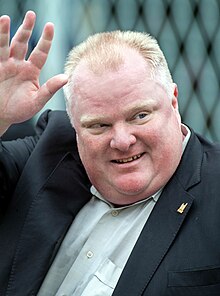
Back روب فورد Arabic روب فورد ARZ Роб Форд Bulgarian Rob Ford Danish Rob Ford German Rob Ford Spanish Rob Ford Estonian راب فورد Persian Rob Ford Finnish Rob Ford French
Rob Ford | |
|---|---|
 Ford in 2013 | |
| 64th Mayor of Toronto | |
| In office December 1, 2010 – November 30, 2014 | |
| Deputy |
|
| Preceded by | David Miller |
| Succeeded by | John Tory |
| Toronto City Councillor for Ward 2 Etobicoke North | |
| In office December 1, 2014 – March 22, 2016 | |
| Preceded by | Doug Ford |
| Succeeded by | Michael Ford |
| In office November 14, 2000 – November 30, 2010 | |
| Preceded by | Ward established |
| Succeeded by | Doug Ford |
| Personal details | |
| Born | Robert Bruce Ford May 28, 1969 Etobicoke, Ontario, Canada |
| Died | March 22, 2016 (aged 46) Toronto, Ontario, Canada |
| Resting place | Riverside Cemetery |
| Political party | Independent (2000–2016)[a] |
| Other political affiliations | Progressive Conservative[1] |
| Spouse |
Renata Brejniak (m. 2000) |
| Relations |
|
| Children | 2 |
| Alma mater | Carleton University (no degree) |
Robert Bruce Ford (May 28, 1969 – March 22, 2016) was a Canadian politician and businessman who served as the 64th mayor of Toronto from 2010 to 2014. Before and after his term as mayor, Ford was a city councillor representing Ward 2 Etobicoke North. He was first elected to Toronto City Council in the 2000 Toronto municipal election, and was re-elected to his council seat twice.
His political career, particularly his mayoralty, saw a number of personal and work-related controversies and legal proceedings.[2] In 2013, he became embroiled in a substance abuse scandal, which was widely reported in national and foreign media.[3][4][5] Following his admission, Ford refused to resign, but city council voted to hand over certain mayoral powers and office staff to Deputy Mayor Norm Kelly for the remainder of Ford's term.[6][7][8]
Ford took a sabbatical and received treatment for his alcohol and drug addiction. Despite the scandal, Ford initially contested the next mayoral election, scheduled for October 2014,[9] but after being hospitalized and diagnosed with an abdominal tumour in September 2014, Ford withdrew from the mayoral race and registered instead to run for his old city council seat.[10] John Tory succeeded him as mayor on December 1, 2014, while Ford regained his former seat. Ford received treatment for the cancer, and was able to return briefly to council, but died in March 2016 after chemotherapy was ineffective.
Cite error: There are <ref group=lower-alpha> tags or {{efn}} templates on this page, but the references will not show without a {{reflist|group=lower-alpha}} template or {{notelist}} template (see the help page).
- ^ Gilbert, Richard (December 30, 2010). "When will Ford's honeymoon end?". Toronto Star. p. A23.
- ^ Dale, Daniel (May 17, 2013). "Rob Ford: 42 remarkable moments from Toronto mayor's career". Toronto Star. Retrieved June 10, 2013.
- ^ Peat, Don (May 25, 2015). "Mayor Rob Ford's unforgettable legacy". Toronto Sun. Postmedia. Retrieved March 23, 2016.
- ^ Alcoba, Natalie; O'Toole, Megan; Humphreys, Adrian; Visser, Josh; Kuitenbrouwer, Peter; Bosanac, Alexandra (October 31, 2013). "Rob Ford says he won't resign after Toronto police say they found video". National Post. Retrieved April 11, 2021.
- ^ McVeigh, Karen (November 5, 2013). "Toronto mayor Rob Ford admits using crack cocaine in a 'drunken stupor'". The Guardian. Retrieved November 9, 2013.
- ^ Schudel, Matt (March 22, 2016). "Rob Ford, troubled and tempestuous Toronto mayor, dies at 46". The Washington Post. ISSN 0190-8286. Retrieved March 22, 2016.
- ^ Staff (November 15, 2013). "Rob Ford stripped of key powers in councilvote". CBC News. Retrieved March 23, 2016.
- ^ Staff (November 18, 2013). "Rob Ford promises 'outright war' as powers further restricted". CBC News. Retrieved March 23, 2016.
- ^ Dale, Daniel (January 2, 2014). "Rob Ford, promising "Ford more years", registers to run for reelection". Toronto Star.
- ^ Torstar News Service. "Toronto 2014 municipal elections: full results". Metro News. Free Daily News Group Inc. Archived from the original (Archive) on October 28, 2014. Retrieved March 23, 2016.